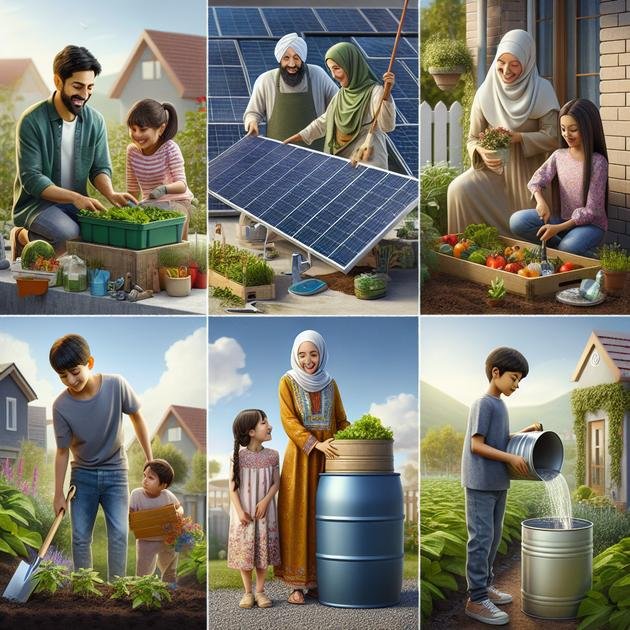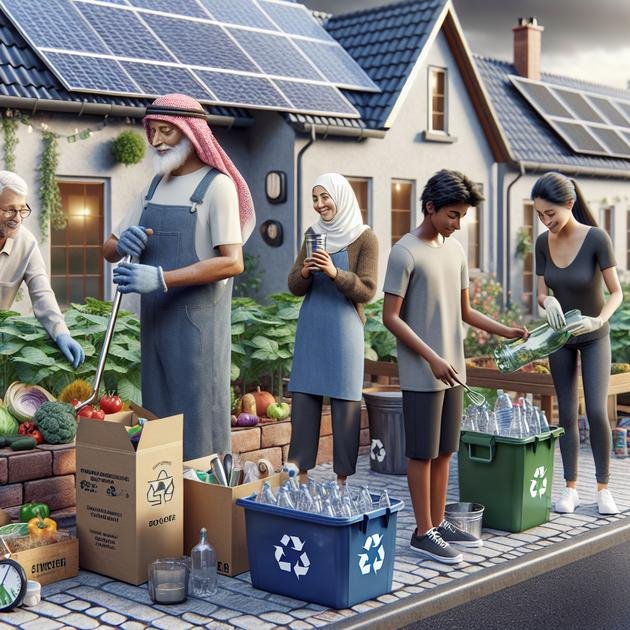Eco conscious parenting involves making sustainable choices in daily family life, teaching children about environmental responsibility, reducing waste, and fostering connections with nature and community to promote a greener future.
If you’ve ever wondered how to raise kids with a respect for nature, eco conscious parenting might be the approach worth exploring. It isn’t always easy, but small changes at home can lead to big differences. Curious about how you can start? Let’s dive into some practical tips for green families.
understanding eco conscious parenting
Eco conscious parenting means making everyday choices that protect the environment while nurturing your child. It’s about teaching kids to respect nature and understand the impact of their actions. This approach encourages families to think beyond convenience and focus on sustainable living.
Core principles of eco conscious parenting
At its heart, it involves reducing waste, choosing sustainable products, and fostering a connection between children and the natural world. Parents model eco friendly habits like recycling, conserving water, and using less energy, showing children how to live gently on the planet.
Why it matters
Teaching children eco conscious values early helps develop lifelong habits that benefit the earth. Kids learn responsibility, empathy, and how small changes at home can contribute to global improvement. This also creates a healthier environment for future generations.
Understanding eco conscious parenting is the first step for families wanting to make a positive difference. It’s not about perfection but about progress, taking simple actions that align with a greener lifestyle.
creating a sustainable home environment
Creating a sustainable home environment involves simple changes that reduce your family’s impact on the planet. Start by switching to energy efficient appliances and LED lighting to cut down electricity use. Managing water wisely with low flow fixtures and fixing leaks can save gallons daily.
Choosing eco friendly materials
Select furniture and home products made of renewable, recycled, or non toxic materials. Natural fibers like organic cotton, wool, or bamboo are better for your family and the environment. Avoid plastic items when possible to reduce waste.
Reducing waste and recycling
Set up easy-to-use recycling stations and compost bins in your kitchen. Teaching kids to sort trash properly encourages habits that lessen landfill waste. Also, try to minimize single-use products by opting for reusable containers and bags.
Indoor plants not only improve air quality but also connect your family to nature. Small steps like these make your home a hub for eco conscious living and teaching moments for children.
choosing eco friendly baby products

Choosing eco friendly baby products means prioritizing safety, sustainability, and minimal environmental impact. Opt for items made from organic, natural, and renewable materials such as organic cotton clothing or bamboo diapers. These choices are gentle on your baby’s skin and better for the planet.
What to look for in products
Focus on chemical free, non toxic ingredients in baby lotions, wipes, and soaps. Avoid plastics containing BPA or phthalates by choosing glass or stainless steel bottles. Look for certifications like USDA Organic or GOTS to ensure product quality and eco standards.
Durability and multi use
Eco friendly baby products often last longer and can be reused or passed down. Cloth diapers and washable wipes save waste, while wooden toys made from sustainably harvested wood avoid plastic pollution. These options offer both practical and environmental benefits.
By selecting sustainable baby gear, you nurture your infant’s well being and teach early lessons in environmental care. Every mindful purchase supports a greener future for your family and the planet.
teaching children about nature and responsibility
Teaching children about nature and responsibility helps build a lifelong respect for the environment. Start by involving kids in simple activities like planting trees, watering plants, or caring for a small garden. These hands-on experiences make nature real and relatable.
Encouraging curiosity and observation
Encourage children to explore outdoors, notice wildlife, and ask questions about the natural world. Providing books and educational games tailored to their age strengthens understanding and keeps learning fun.
Modeling responsible behavior
Parents play a key role by demonstrating eco friendly habits such as recycling, conserving water, and reducing waste. Kids often imitate adults, so practicing what you teach is vital.
Teaching responsibility also means explaining how everyday choices affect the planet and why conservation matters. This nurtures empathy and a sense of stewardship from a young age.
reducing waste in family routines
Reducing waste in family routines is a powerful way to lessen your environmental impact. Start by cutting down on single use items like plastic bags, disposable plates, and water bottles. Instead, use reusable bags, dishes, and refillable bottles that can be cleaned and used again.
Implementing recycling and composting
Set up clear recycling bins for paper, plastic, and glass to make sorting easy for the whole family. Compost food scraps and garden waste to reduce landfill contributions and create nutrient rich soil for your garden.
Mindful shopping and meal planning
Planning meals ahead reduces food waste by allowing you to buy only what’s needed. Choose products with minimal packaging or packaging that can be recycled. Buying in bulk or from local farmers also helps reduce waste.
Teaching children about waste reduction through daily habits creates a culture of sustainability at home. Small changes, like fixing broken items instead of discarding them, can add up to big environmental benefits.
encouraging outdoor activities and exploration

Encouraging outdoor activities and exploration is vital for children’s health and environmental awareness. Regular time spent outside helps kids develop physical strength, creativity, and a deeper connection with nature. Simple activities like hiking, biking, or nature walks introduce them to diverse plants, animals, and ecosystems.
Making outdoor time fun and educational
Equip children with tools such as binoculars, magnifying glasses, or field guides to spark curiosity and learning. Outdoor games and scavenger hunts focused on natural elements promote engagement and discovery.
Benefits for family bonding and well being
Exploring together strengthens family ties while reducing screen time. Fresh air and sunlight improve mood and concentration, boosting overall health.
Encouraging kids to respect and care for the environment during outdoor activities teaches responsibility and stewardship. These experiences lay the foundation for an eco conscious lifestyle.
supporting eco friendly food choices
Supporting eco friendly food choices means selecting foods that have a lower impact on the environment. This includes eating more plant based meals, choosing organic and locally grown produce, and reducing food waste. These habits help conserve water, reduce greenhouse gas emissions, and protect ecosystems.
Benefits of plant based diets
Incorporating more vegetables, fruits, grains, and legumes reduces reliance on resource intensive animal farming. Plant based diets offer health benefits and align with sustainable living values.
Shopping smart
Buying local and seasonal foods supports regional farmers and cuts down on transportation emissions. Choosing organic products means fewer synthetic pesticides and fertilizers, promoting soil and water health.
Planning meals carefully helps use leftovers and reduces waste. Teaching children about how food choices affect the planet encourages mindful eating habits that last a lifetime.
building a community with green values
Building a community with green values starts by connecting with others who share a commitment to sustainability. Joining local environmental groups or participating in community gardens encourages collaboration and the sharing of eco friendly ideas. These connections strengthen support for green practices.
Organizing green events
Host or attend activities like clean up days, recycling drives, and educational workshops to spread awareness and engage neighbors. Communities that work together can make a bigger impact in conserving resources and protecting local environments.
Supporting local eco initiatives
Encourage local businesses that prioritize sustainability and buy products from eco conscious vendors. Promoting these efforts helps create a healthier economy aligned with green values.
Teaching children the importance of community and shared responsibility leads to lifelong habits of care for the planet. Collective action amplifies positive change beyond individual efforts.
Bringing eco conscious parenting into everyday life
Adopting eco conscious parenting means making thoughtful choices that benefit both your family and the planet. Small steps like building green habits at home, teaching responsibility, and connecting with a supportive community add up to lasting change.
By involving your children and leading by example, you pass on values that nurture a healthier environment and a brighter future. Remember, every effort counts when families come together for a greener world.





